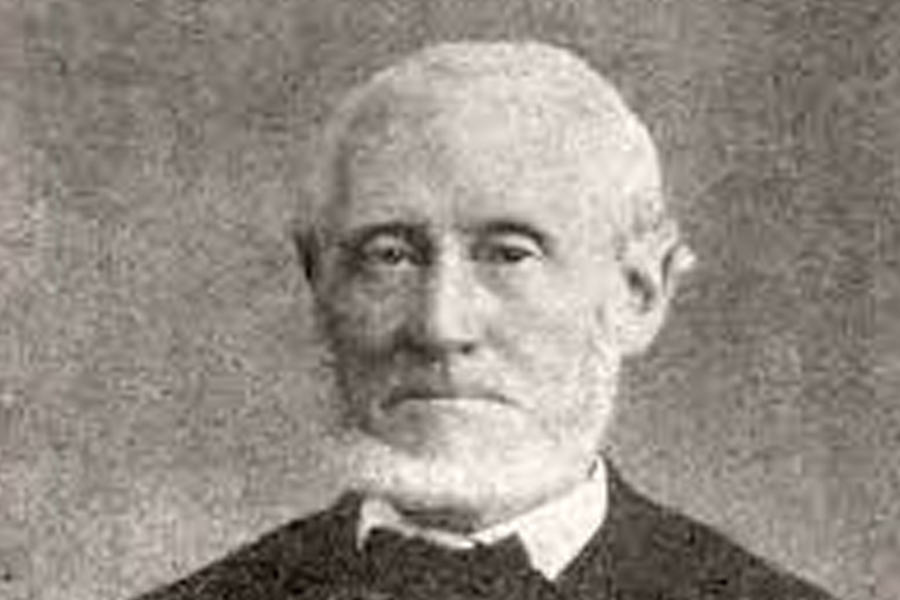Basic Information
| Field | Details |
|---|---|
| Full Name | Andrew Jackson Borden |
| Birth | September 13, 1822, Fall River (then Troy), Massachusetts |
| Death | August 4, 1892, Fall River, Massachusetts |
| Occupations | Carpenter, undertaker, furniture dealer, real estate investor, textile director, banker |
| Known For | Prominent Fall River businessman; father of Lizzie Borden; victim in the 1892 double homicide |
| Spouses | Sarah Anthony Morse (m. 1845–1863); Abby Durfee Gray (m. 1865–1892) |
| Children | Emma Lenora (1851–1927), Alice Esther (1856–1858), Lizzie Andrew (1860–1927) |
| Primary Residence | 92 Second Street, Fall River, Massachusetts |
| Estimated Net Worth at Death | ~$300,000 in 1892 (roughly $10 million today) |
| Burial | Oak Grove Cemetery, Fall River, Massachusetts |
Early Life and Upward Mobility
Born into modest means, Andrew Jackson Borden grew up in a Fall River poised to shift from rural outpost to industrial engine. His parents, Abraham Bowen Borden and Phoebe Davenport Borden, worked hard and lived lean, and Andrew learned those lessons early. As a young man he hired on as a carpenter and is often noted to have spent time in the undertaking and furniture trades—work that gave him a practical eye and a steady cash flow. By middle age, he had leveraged Fall River’s textile boom into well-placed investments, climbing step by deliberate step.
In an era that rewarded long hours and caution, Borden’s habits were almost a creed: thrift, routine, and a preference for sure things over risk. He acquired properties, joined boards, and built a reputation for reliability. His public image was not flashy, but in a mill town that ran on capital and cotton, he was a man whose handshake meant money.
Family: Affection, Austerity, and Tension
Borden married Sarah Anthony Morse on Christmas Day, 1845. They had three daughters: Emma, Alice, and Lizzie. Tragedy struck early when Alice died in 1858. After Sarah’s death in 1863, Andrew married Abby Durfee Gray in 1865, a respectable match that nonetheless never quite fused the household. Emma and Lizzie are reported to have addressed their stepmother as “Mrs. Borden,” a small but telling detail in a home where courtesy often substituted for warmth.
The family lived decently by local standards, but Andrew’s severe frugality kept it austere. Even as the city modernised, the Second Street house remained plain and lacking in contemporary conveniences. Andrew murdering Lizzie’s barn pigeons, allegedly because they attracted trespassers, is a common source of animosity. Andrew gave land to Abby’s relatives and then his daughters to settle the score, which exacerbated tensions. This family saw estates as fault lines, not numbers.
The House on Second Street
The Second Street address, later infamous, was central to the Borden narrative. It sat well south of Fall River’s grander hill district, a choice that reflected Andrew’s preference for proximity to business and his disinterest in conspicuous status. The house was orderly, unadorned, and run with the regimentation of a ledger. Privacy and propriety were paramount. Doors locked, routines held, and the household moved like clockwork—until August 4, 1892, when the gears snapped.
Career, Positions, and Wealth
Andrew Borden’s career reads like a map of Fall River’s economy:
- Trades: Carpenter; work in undertaking and furniture sales.
- Real estate: Multiple properties across the city, yielding steady rent and capital appreciation.
- Textiles: Directorships and investments connected to local mills (e.g., Globe Yarn, Troy Cotton & Woolen).
- Banking: Leadership roles that culminated in substantial influence in savings and trust institutions.
He was not known for speculative ventures and left no major debts. Probate tallies from 1892 place his estate at roughly $300,000—an impressive sum for a man who preferred steady dividends over showy bets. His style was like compound interest personified: quiet, relentless, effective.
August 4, 1892: Violence and Aftermath
Andrew and his second wife, Abby, were murdered in their home on the morning of August 4, 1892, with a hatchet-like weapon. Lizzie, then 32, was arrested and tried in 1893. The jury acquitted her, and no one else was convicted. In the legal sense, the case ended there; in the public mind, it never did. With no will found, the estate passed primarily to Emma and Lizzie after legal formalities, further fueling speculation that money lay coiled at the center of the tragedy.
The trial unspooled the family’s tensions in public: disputed property transfers, household resentments, the strict economy of a wealthy man who refused extravagance. Yet definitive answers never surfaced. The story settled into the American imagination as a riddle—one part blood and two parts silence.
Myths, Rumors, and Reputation
Like any household name tethered to a sensational crime, Andrew Borden’s memory carries cargo that ranges from plausible to preposterous. Rumors that he committed ghoulish shortcuts in the undertaking trade remain unsubstantiated. The oft-mentioned pigeon incident is widely reported but is best understood as a signpost of simmering family conflict rather than a single cause of catastrophe. Theories circulate—from gas attacks to shadowy intruders to an alleged illegitimate son—but none have met the standard of proof.
Modern discussions, from neighborhood tours to social media threads, tend to cast Andrew as emblem or symbol: the flinty patriarch, the miser, the self-made New Englander, the man who could add columns of figures but not subtract the distances in his own parlor. Whether fair or not, that image has stuck.
Timeline
| Year | Event |
|---|---|
| 1822 | Born in Fall River, Massachusetts |
| 1845 | Marries Sarah Anthony Morse |
| 1851 | Birth of Emma Lenora Borden |
| 1856 | Birth of Alice Esther Borden |
| 1858 | Death of Alice Esther Borden |
| 1860 | Birth of Lizzie Andrew Borden |
| 1863 | Death of Sarah (Morse) Borden |
| 1865 | Marries Abby Durfee Gray |
| 1870s–1880s | Expands investments in mills, real estate, and banking |
| 1892 | Andrew and Abby Borden murdered at 92 Second Street |
| 1893 | Lizzie Borden tried and acquitted |
| 1890s | Estate distributed largely to Emma and Lizzie |
The Man Behind the Ledger
To his peers, Andrew Borden was a pillar—staid, punctual, unyielding on debt and duty. To his daughters, he was both provider and gatekeeper, a man who could finance anything but would rarely approve everything. He kept a tidy balance sheet; the mess lay in the margins. He climbed from carpentry to capital, then died amid whispers money could neither quiet nor explain. If the mills gave Fall River its hum, Andrew J. Borden gave it a face: flint-eyed, exacting, and determined to the last.
Pop Culture and Enduring Echoes
The tragic rhyme—“forty whacks”—cemented the Bordens in folk memory, however inaccurate the count. Films, series, stage works, and endless retellings keep reviving the household, each version retilting the lens. In these echoes, Andrew often appears as the stern patriarch whose thrift bordered on a worldview. He is the flint in the tinderbox, essential to the spark even if he did not strike it.
FAQ
Did Andrew Jackson Borden leave a will?
No, a will was never found; his estate was distributed under intestacy, with Emma and Lizzie inheriting the bulk.
How wealthy was he at the time of his death?
His estate was valued at about $300,000 in 1892, roughly equivalent to $10 million today.
Was the Borden household truly austere despite their wealth?
Yes, by contemporary accounts the home was run with strict economy and had limited modern conveniences for its time.
What were his main business interests?
He invested in real estate, held bank posts, and served as a director or investor in local textile mills.
Did tensions over property play a role in family conflict?
Yes, property transfers to Abby’s relatives and later deeds to the daughters are widely cited as points of friction.
What happened on August 4, 1892?
Andrew and Abby Borden were murdered in their home; Lizzie was later tried and acquitted.
Is there any proof of an illegitimate son connected to the murders?
No, that theory remains speculative and unproven.
Did Andrew really kill Lizzie’s pigeons?
Reports claim he did, allegedly to deter trespassers; it’s often mentioned as a flashpoint in household tensions.
Was he known for unethical practices in his early undertaking work?
Stories exist, but they are unsubstantiated and likely fueled by later gossip.
Who inherited Andrew Borden’s estate?
After legal proceedings, Emma and Lizzie Borden were the principal heirs.



